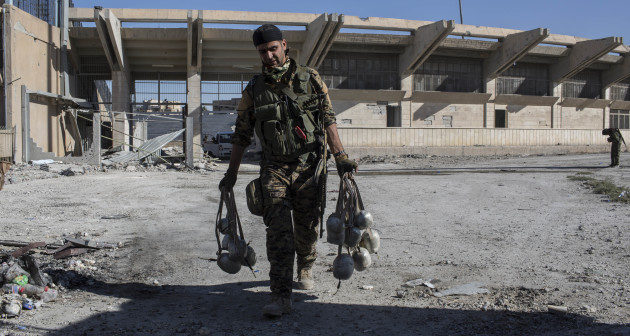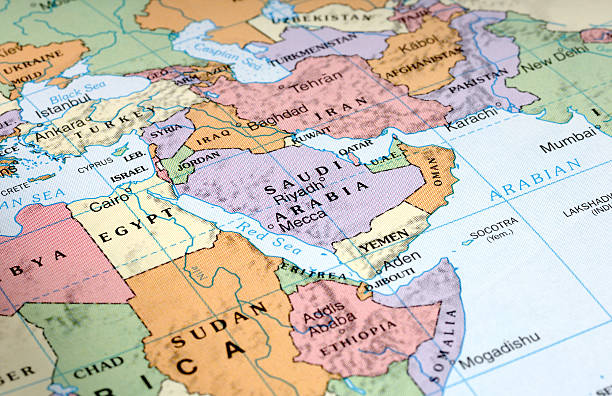
The war in Syria appears to be coming to an end and the return of ISIS fighters and families to their countries is becoming a major issue.
The UK is unwilling to agree to the return of Shamima Begum, an unrepentant ISIS wife. And the US State Department has said that Hoda Muthana, another ISIS wife “is not a U.S. citizen and will not be admitted into the United States. She does not have any legal basis, no valid U.S. passport, no right to a passport, nor any visa to travel to the United States.”
Turkish daily Hürriyet reported today that the US has asked Turkey to undertake the protection of ISIS children. What that means is not clear, but it probably involves a US financial contribution to meet their needs, provide for their education, etc. It is more than likely that soon will come to another proposal for the settlement of ISIS families in Turkey. After all, Washington must think, a Turkish foreign minister had once referred to them as “angry kids”.
The proposal is outrageous and must be flatly rejected by the Turkish government because Turkey has already an ISIS problem of its own. And those who constantly say in the West that the fight against ISIS is far from over must sober up. This is no way to continue the so-called battle against ISIS.
Rejection of ISIS returnees defies what the UN Security Council has agreed in the recent past.
The UN Security Council has adopted numerous resolutions on combating terrorism. Two are more relevant to today’s agenda: RES/2178(2014) of 24 September 2014 (1) and RES/2396(2017) of 21 December 2017 (2).
RES/2178(2014) defines foreign terrorist fighters (FTF) as “individuals who travel to a State other than their States of residence or nationality for the purpose of the perpetration, planning, or preparation of, or participation in, terrorist acts or the providing or receiving of terrorist training, including in connection with armed conflict”.
It recognizes that terrorism will not be defeated by military force, law enforcement measures, and intelligence operations alone, and underlines the need to address the conditions conducive to the spread of terrorism, as outlined in Pillar I of the United Nations Global Counter-Terrorism Strategy (3)
It calls upon all Member States, in accordance with their obligations under international law, to cooperate in efforts to address the threat posed by foreign terrorist fighters, including by preventing the radicalization to terrorism and recruitment of foreign terrorist fighters, including children, preventing foreign terrorist fighters from crossing their borders, disrupting and preventing financial support to foreign terrorist fighters, and developing and implementing prosecution, rehabilitation and reintegration strategies for returning foreign terrorist fighters.
RES/2396(2017) recalling Resolution 2178 expresses grave concern over the acute and growing threat posed by foreign terrorist fighters returning or relocating, particularly from conflict zones, to their countries of origin or nationality, or to third countries.
It calls upon the Member States:
- to improve international cooperation to prevent the undetected travel of foreign terrorist fighters from or through their territories, especially returning and relocating foreign terrorist fighters;
- to assess and investigate suspected individuals whom they have reasonable grounds to believe are terrorists, including suspected foreign terrorist fighters and their accompanying family members, including spouses and children, entering those Member States’ territories;
- to develop and implement comprehensive risk assessments for those individuals, and to take appropriate action, including by considering appropriate prosecution, rehabilitation, and reintegration measures.
- to ensure that they take all such action in compliance with domestic and international law;
- to ensure that any person who participates in the financing, planning, preparation or perpetration of terrorist acts or in supporting terrorist acts is brought to justice;
- to develop and implement comprehensive and tailored prosecution, rehabilitation, and reintegration strategies in accordance with their obligations under international law, including with respect to foreign terrorist fighters and spouses and children accompanying returning and relocating foreign terrorist fighters, as well as their suitability for rehabilitation.
- to consider engaging, where appropriate, with religious authorities, community leaders and other civil society actors, who have relevant expertise in crafting and delivering effective counter-narratives, in countering narratives used by terrorists, including foreign terrorist fighters, and their supporters;
And, the Resolution recognizes the importance of providing timely and appropriate reintegration and rehabilitation assistance to children associated with foreign terrorist fighters returning or relocating from conflict zones, including through access to health care, psychosocial support and education programs that contribute to the well-being of children and to sustainable peace and security.
US State Department’s “FACT SHEET Resolution 2396 (2017) on Foreign Terrorist Fighters (Returnees and Relocators)” confirms the foregoing. The Resolution it says,
“Urges Member States, in compliance with relevant domestic and international law, to assess and investigate suspected FTFs – including their accompanying family members – and implement prosecution, rehabilitation, and reintegration strategies, as called for in Resolution 2178, and to ensure that such strategies are a part of their national counterterrorism strategies;
“Underscores the importance of a whole-of-government approach and recognizes the role civil society organizations play in the rehabilitation and reintegration of returning and relocating FTFs and their families.” (4)
It is interesting that RES/2178(2014) was adopted in the heyday of “Friends of Syria Group” meetings when, in the eyes of Middle East dreamers, President Assad’s ouster appeared close. By contrast RES/2396(2017) was adopted two years after the Russian intervention in Syria which led to a dramatic reversal on the battlefield raising the possibility of the return home of FTFs. The latter Resolution, again interestingly, was adopted a year after President Trump’s inauguration. In other words, it cannot be blamed on the Obama administration.
Regime change is a daunting task, far more likely to fail than succeed as experience shows. And failure means penalizing consequences. All state actors involved in the regime change project in Syria were inclined to look at anti-Assad terrorist groups as useful tools which could be dealt with in due course. They proved wrong and must now pay the price and that includes agreeing to the return of ISIS fighters and families and bringing them before justice. Trying to have other countries to pay the price by attempting to create moral/legal dilemmas would be a glaring double standard and a violation of UN Security Council resolutions they themselves have adopted. If their independent courts are unable to judge based on available evidence that these individuals are terrorists that is their problem. And, if they prefer to let Syrian justice deal with the problem, again this should be their decision.
…………………………………………………………………………….
(1) https://undocs.org/S/RES/2178(2014)
(2) https://undocs.org/S/RES/2396(2017)
(3) https://www.un.org/counterterrorism/ctitf/en/un-global-counter-terrorism-strategy#poa1
(4) https://usun.state.gov/remarks/8237
Ali Tuygan, Ambassador (Ret’d) and former Undersecretary of the Turkish Foreign Ministry. The article is also published on his blog: https://diplomaticopinion.com/2019/02/22/is-fighters-homecoming-price-for-the-regime-change-project-in-syria/#more-1302









